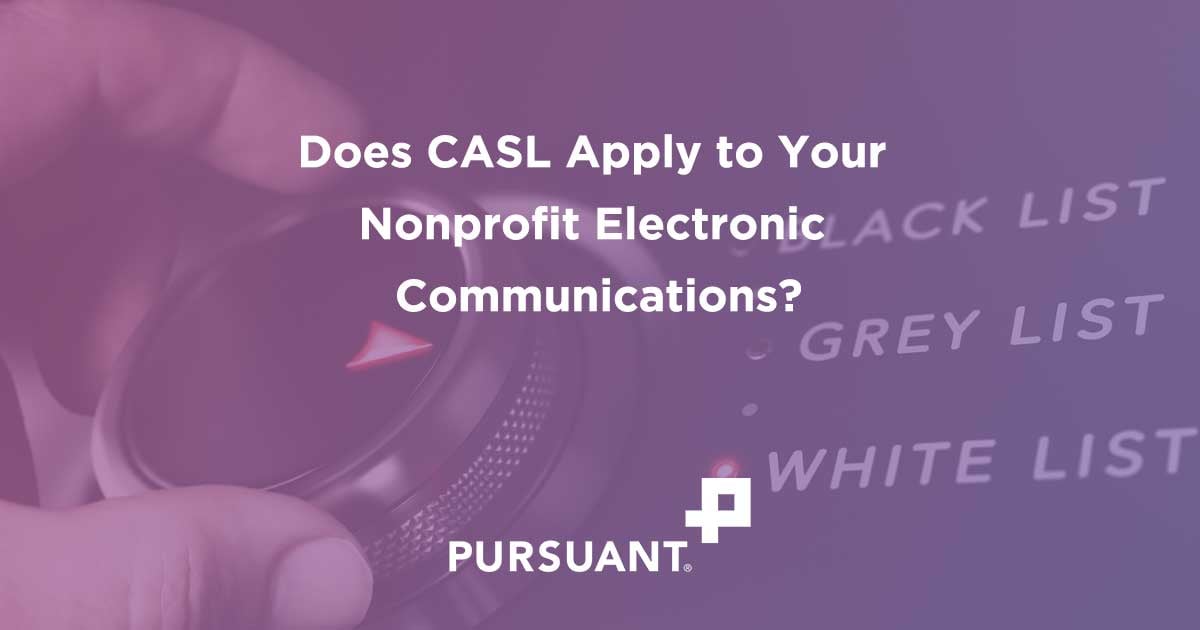Does CASL apply to your Nonprofit Electronic Communications?

Canada’s new Anti-Spam Legislation went into effect, forcing many nonprofit organizations that are based or have donors in Canada to re-evaluate their communications strategy. While the primary purpose of Act targets commercial spam, it has required nonprofits to reevaluate some of the communication tools they have routinely used over many years.
A few weeks ago, we shared the top five things nonprofit leaders should know about CASL. Today, we wanted to dive a little deeper into when your nonprofit could be in violation of the law and when it is exempt.
Does CASL apply to your Nonprofit Electronic Communications?
A few weeks ago, the Canadian Radio-television and Telecommunications Commission provided some great clarity about which electronic communication messages violated the laws and which where exempt.
While the laws and penalties for violating CASL do apply to nonprofit organizations and registered charities, electronic messages that are sent for the primary purpose of raising funds are exempt.
Here are a few examples of commercial electronic communications that do NOT violate CASL laws:
- An email sent on behalf of a charity that promotes an event where the proceeds from ticket sales are designated for the registered charity (e.g. – a dinner, golf tournament, or fundraising event)
- An e-Newsletter, which provides information about the charity’s upcoming campaign, but does not contain a call-to-action that encourages the recipient to participate. Because it doesn’t contain a “commercial appeal,” CASL does not apply.
- An e-Newsletter about an upcoming campaign that includes information about a corporate sponsor but was sent for the primary purpose of raising funds. If your email includes a call-to-action that solicits donations and does not encourage the recipient to participate in a commercial activity with the corporate sponsor, you are not violating CASL.
Here’s an example of when your nonprofit would be in violation of the law:
- An email or e-Newsletter that shares information about an upcoming campaign or social issue AND you encourage the recipient to participate in a commercial activity with a corporate sponsor, but do not include any fundraising opportunity.
How to Adapt Your Nonprofit Communications for CASL
Because the laws can be a little confusing, the best thing your nonprofit organization can do is to make sure you are completed prepared. A few weeks ago, Blackbaud shared some valuable tips to help nonprofits prepare for the changes.
Here are three steps you can take to adapt your communications strategy for CASL:
- Get Consent. Create a form for your email list to fill out that allows them to sign up for the types of emails they receive. For example, one recipient might want to receive your monthly newsletter while another only wants to hear about upcoming events.
- Review Your Current Strategy. Make sure that your current emails and templates are all in compliance with CASL regulations. In each email template, you want to make sure that your organization is clearly identified and that people have the opportunity to unsubscribe from your emails.
- Adapt Your Internal Processes. Task someone in your organization for getting all of your electronic messages up-to-speed. Allow them to serve as the gatekeeper for all future electronic messages until everyone is familiar with the changes.
If you want to stay informed about all of the latest insights and trends regarding CASL, be sure to subscribe to our content here. Over the next few weeks, we’ll be diving deeper into how the new laws are impacting the future of nonprofit communications and what it means for your organization.
the Canadian Radio-television and Telecommunications Commission